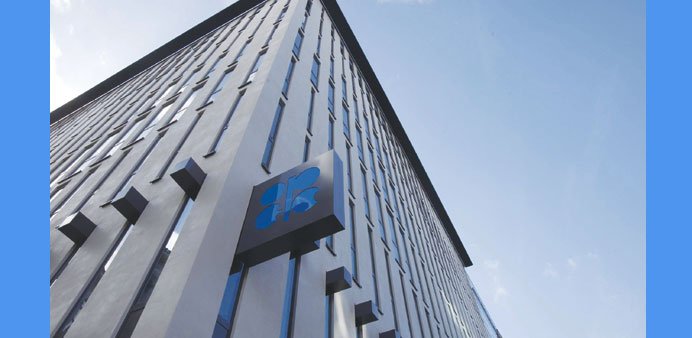The increase of about 40% in oil prices from a six-year low in January has vindicated Opec’s strategy to keep pumping into a supply glut and force higher-cost producers to curb output.
Bloomberg/London
The Organisation of Petroleum Exporting Countries will stick to its strategy of favouring market share over prices when it meets in Vienna this Friday.
That means the 12 nations will maintain a group production target of 30mn bpd, according to all but one of 34 traders and analysts surveyed by Bloomberg.
The increase of about 40% in oil prices from a six- year low in January has vindicated Opec’s strategy to keep pumping into a supply glut and force higher-cost producers to curb output.
Following are the latest comments from Opec members and analysts. The respective shares of the group’s supply are based on April levels. The estimates for the price per barrel each member needs to balance its budget are from the International Monetary Fund unless stated otherwise.
ALGERIA
♦ Price needed: $111
♦ Share of Opec production: 3.6%
♦ Algeria’s attempt to coordinate a response to falling oil prices after a meeting with Angola and Nigeria in March didn’t result in an agreement. The new energy minister Salah Khebri is “expected to be restrained at his first Opec meeting,” Citigroup said.
ANGOLA
♦ Price needed: $98 (ING)
♦ Share of Opec production: 5.3%
♦ Angola is among the biggest losers from lower prices and has little scope to boost output, said Bloomberg First Word Oil Strategist Julian Lee; its goal of producing 2mn bpd has been delayed to 2017, according to Bloomberg Intelligence.
ECUADOR
♦ Price needed: $117 (ING)
♦ Share of Opec production: 1.7%
♦ Ecuador lost $2.2bn in expected revenue from September to March following the oil slump, while prices fell below production costs for “many oil fields” in March, President Rafael Correa said last month.
IRAN
♦ Price needed: $93
♦ Share of Opec production: 8.8%
♦ Iran probably won’t argue for production cuts at the meeting because it hopes to restore exports after the removal of sanctions, Citigroup said; the country would be satisfied with oil prices of $70 to $75, according to Oil Minister Bijan Namdar Zanganeh.
IRAQ
♦ Price needed: $71
♦ Share of Opec production: 12%
♦ Iraq plans to boost crude exports by 26% to a record 3.75mn bpd this month, according to shipping programmes.
KUWAIT
♦ Price needed: $47
♦ Share of Opec production: 9%
♦ Keeping the group’s output ceiling unchanged in November was the “best option” and Opec is now more unified behind the target, Oil Minister Ali al-Omair said last month; Opec will “stick with” its present strategy, Abdulmajeed al-Shatti, a member of Kuwait’s Supreme Petroleum Council, said on May 12.
LIBYA
♦ Price needed: $215
♦ Share of Opec production: 1.7%
♦ Libya is struggling to return production to levels achieved before the civil war started in 2011, according to Bloomberg Intelligence; monthly output has swung between 850,000 to 250,000 bpd over the past year amid conflict between two rival governments, data compiled by Bloomberg show. Opec probably won’t change its output target at the June 5 meeting, Libya’s deputy vice prime minister for energy said last week.
NIGERIA
♦ Price needed: $119 (ING)
♦ Share of Opec production: 6.3%
♦ Nigeria has been unable to increase production sufficiently to offset the fall in oil prices, according to Bloomberg Intelligence; output rose 80,000 bpd to 1.98mn in April, the first gain this year, data compiled by Bloomberg show.
QATAR
♦ Price needed: $59
♦ Share of Opec production: 2.2%
n Qatar is the Opec member least dependent on oil and has the lowest crude-production costs, making it well placed to withstand a period of oversupply and low prices, according to Bloomberg Intelligence.
SAUDI ARABIA
♦ Price needed: $103
♦ Share of Opec production: 33%
♦ The world’s largest oil exporter boosted crude production for a fourth month in April to the highest level since at least 1970, escalating its quest to preserve market share amid a surge in non-Opec production.
UAE
♦ Price needed: $73
♦ Share of Opec production: 9.2%
♦ The UAE sided with Saudi Arabia, Kuwait and Qatar in November, rebuffing pleas from other members to cut output to support prices; the country’s “vast financial wealth” should provide “ample time for adjustment” should oil prices remain below $70 next year, Deutsche Bank said last month.
VENEZUELA
♦ Price needed: $121 (ING)
♦ Share of Opec production: 7.9%
♦ Venezuela led a faction of Opec members calling for an output cut in November, but its “poor history” of compliance with Opec quotas undermines the position, Citigroup said. President Nicolas Maduro said last month it was in his country’s and Opec’s best interests for prices to stabilise at $100 in the medium term. Oil Minister Asdrubal Chavez arrived in Vienna on Monday without commenting.

